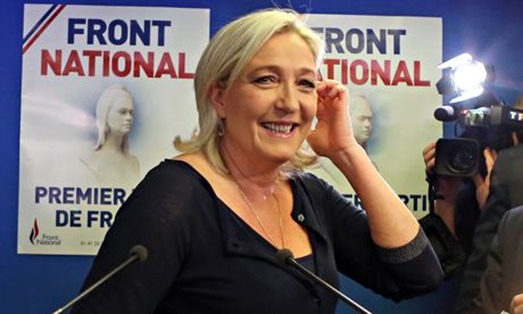Guardian
May 26, 2014

France’s nationalist extreme right turned European politics upside down on Sunday, trouncing the governing Socialists and the mainstream conservatives in the European parliamentary elections which across the continent returned an unprecedented number of MEPs hostile to, or sceptical about, the European Union in a huge vote of no confidence in Europe’s political elite.
According to exit polls, the Front National of Marine Le Pen came first in France with more than 25% of the vote. The nationalist anti-immigrant Danish People’s party won by a similar margin in Denmark. In Austria, the far right Freedom Party took one fifth of the vote, according to projections, while on the hard left, Alexis Tsipras led Greece’s Syriza movement to a watershed victory over the country’s two governing and traditional ruling parties, New Democracy conservatives and the Pasok social democrats.
The voting across four days in 28 countries, according to exit polls late on Sunday, delivered a string of sensational outcomes, with radical and nationalist anti-EU forces scoring major victories both on the far right and the hard left.
In Britain, the Nigel Farage-led insurrection against Westminster was also tipped to unsettle the polticial mainstream by coming first or second in the election. The Tories, the biggest UK caucus in the parliament for 20 years, faced the prospect of being pushed into third place.
In Germany, the most powerful EU state, Chancellor Angela Merkel’s Christian Democrats scored an expected easy victory, but Germany also returned its first eurosceptics in the form of the Alternative for Germany as well as its first neo-Nazi MEP from the Hitler apologists of the National Democratic Party of Germany, according to German TV projections.
And Merkel’s Christian Democrats dropped several points while the SPD (social democrats) made significant gains, narrowing the gap between the two big parties to around 8 percentage points.
The election mattered more than ever before because the Strasbourg-based parliament has gained greater powers, meaning it will have a strong say in most EU legislation over the next five years and will also shape the outcome of the battle for the most powerful post in Brussels, the new head of the EU executive or European commission. However, its mandate to exercise those powers was dented by the low turnout, at around 45%, raising renewed questions about the parliament’s legitimacy.

